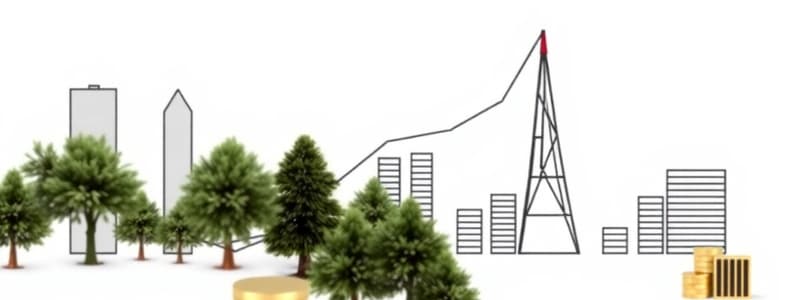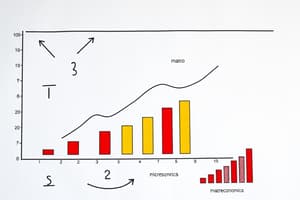Podcast
Questions and Answers
The Incentive Principle explains that a rational person will participate in more of an activity if:
The Incentive Principle explains that a rational person will participate in more of an activity if:
- The opportunity cost of the activity decreases.
- The marginal benefit of the activity rises. (correct)
- The activity provides greater social recognition.
- The activity is more enjoyable.
According to the Incentive Principle, when the marginal cost of an activity increases, a rational person will:
According to the Incentive Principle, when the marginal cost of an activity increases, a rational person will:
- Remain indifferent to the change in cost.
- Decrease the level of the activity. (correct)
- Seek out alternative activities with lower marginal costs.
- Increase the level of the activity.
A self-interested individual makes decisions based on:
A self-interested individual makes decisions based on:
- The pressure from their peers.
- The needs of the community.
- The advice of experts.
- Their own personal assessment of costs and benefits. (correct)
Which of the following scenarios is NOT a good example of how a self-interested individual might make a decision?
Which of the following scenarios is NOT a good example of how a self-interested individual might make a decision?
The Incentive Principle helps to explain why people respond to changes in:
The Incentive Principle helps to explain why people respond to changes in:
A professional athlete who chooses to quit their sport for a less demanding job, despite earning a lower salary, is likely motivated by:
A professional athlete who chooses to quit their sport for a less demanding job, despite earning a lower salary, is likely motivated by:
If the cost of attending a college increases, we would expect:
If the cost of attending a college increases, we would expect:
A self-interested individual is motivated by:
A self-interested individual is motivated by:
What is the primary focus of microeconomics?
What is the primary focus of microeconomics?
What does the Cost-Benefit Principle suggest?
What does the Cost-Benefit Principle suggest?
Which statement best describes a positive statement?
Which statement best describes a positive statement?
What occurs as a result of scarcity?
What occurs as a result of scarcity?
What does Adam's emotional response suggest about his character?
What does Adam's emotional response suggest about his character?
What is the Economic Surplus for Alex after attending the comedy show?
What is the Economic Surplus for Alex after attending the comedy show?
Which term describes the total economic surplus?
Which term describes the total economic surplus?
What characterizes normative statements?
What characterizes normative statements?
How is marginal cost defined?
How is marginal cost defined?
What characterizes a rational decision maker?
What characterizes a rational decision maker?
Under what condition should a rational decision maker take action?
Under what condition should a rational decision maker take action?
What is a common misconception about normative statements?
What is a common misconception about normative statements?
What did Milton Friedman believe about Mother Theresa?
What did Milton Friedman believe about Mother Theresa?
Which of the following is an example of a positive statement?
Which of the following is an example of a positive statement?
What action did Armen Alchain and Gordon Tullock advocate in their letter to FDR?
What action did Armen Alchain and Gordon Tullock advocate in their letter to FDR?
What can be concluded about Paula's decision to see 8 movies based on her Marginal Benefit and Marginal Cost?
What can be concluded about Paula's decision to see 8 movies based on her Marginal Benefit and Marginal Cost?
Which branch of economics focuses on individual decision-makers and their interactions?
Which branch of economics focuses on individual decision-makers and their interactions?
What best describes a 'Self-Interested' person?
What best describes a 'Self-Interested' person?
When considering government policies, which factor should decision makers recognize?
When considering government policies, which factor should decision makers recognize?
What kind of marginal benefit appears to characterize Ann's iced coffee consumption?
What kind of marginal benefit appears to characterize Ann's iced coffee consumption?
At a cost of $2.25 per cup, how many cups of iced coffee should Ann consume to maximize her benefit?
At a cost of $2.25 per cup, how many cups of iced coffee should Ann consume to maximize her benefit?
Which of the following arguments regarding automobile safety is considered less effective?
Which of the following arguments regarding automobile safety is considered less effective?
Which statement about raising the minimum wage is typically supported?
Which statement about raising the minimum wage is typically supported?
Flashcards
Economics
Economics
The study of how people make choices under limited resources and the consequences of those choices on individuals and society.
Scarcity
Scarcity
The situation where there are limited resources to satisfy unlimited wants and needs.
Tradeoffs
Tradeoffs
The idea that acquiring more of something often means getting less of something else.
Microeconomics
Microeconomics
Signup and view all the flashcards
Macroeconomics
Macroeconomics
Signup and view all the flashcards
Positive statement
Positive statement
Signup and view all the flashcards
Normative statement
Normative statement
Signup and view all the flashcards
Cost-Benefit Principle
Cost-Benefit Principle
Signup and view all the flashcards
Incentive Principle
Incentive Principle
Signup and view all the flashcards
Self-interested individual
Self-interested individual
Signup and view all the flashcards
What is Economics?
What is Economics?
Signup and view all the flashcards
How is the Incentive Principle used in Economics?
How is the Incentive Principle used in Economics?
Signup and view all the flashcards
Why might fewer people graduate high school if the earnings difference decreased?
Why might fewer people graduate high school if the earnings difference decreased?
Signup and view all the flashcards
What happens when the benefits of an activity decrease?
What happens when the benefits of an activity decrease?
Signup and view all the flashcards
How does economics analyze decisions?
How does economics analyze decisions?
Signup and view all the flashcards
How does economics analyze events and actions?
How does economics analyze events and actions?
Signup and view all the flashcards
Marginal Benefit
Marginal Benefit
Signup and view all the flashcards
Marginal Cost
Marginal Cost
Signup and view all the flashcards
Rational Decision Making
Rational Decision Making
Signup and view all the flashcards
Economic Surplus
Economic Surplus
Signup and view all the flashcards
Irrational Individual
Irrational Individual
Signup and view all the flashcards
Self-Interested
Self-Interested
Signup and view all the flashcards
Policy Changes Influence Behavior
Policy Changes Influence Behavior
Signup and view all the flashcards
Diminishing Marginal Benefit
Diminishing Marginal Benefit
Signup and view all the flashcards
Optimal Consumption
Optimal Consumption
Signup and view all the flashcards
Study Notes
Foundations of Economics
- Economics is the social science that studies how people make decisions when resources are limited. It considers both individual and societal impacts of these decisions.
- Scarcity is a fundamental economic concept where limited resources force tradeoffs.
- Tradeoffs occur because obtaining more of one thing often means foregoing some amount of another.
- Microeconomics focuses on individual decision makers (like households and firms) and their interactions.
- Macroeconomics looks at the overall economy, including measures like inflation, unemployment, and GDP growth.
- Positive statements describe the world as it is, focusing on facts and data.
- Normative statements express opinions about how the world should be, often incorporating values and judgments.
- A rational decision maker acts to achieve a well-defined goal by making choices that maximize benefits and minimize costs.
- Total Benefits are the overall gains from an action.
- Total Costs are the overall burdens associated with an action.
- Total Economic Surplus represents the difference between total benefits and total costs.
- The Cost-Benefit Principle suggests an activity should be pursued if the additional benefits outweigh the additional costs.
- Marginal Benefit is the change in total benefits from undertaking one additional unit of an activity.
- Marginal Cost is the change in total costs from undertaking one more unit of the activity.
- The Incentive Principle highlights that a rational decision maker will adjust their behavior if the associated costs or benefits change.
Multiple Choice Questions (Examples)
- Incentive Principle: An action should be taken if its additional benefits are at least as great as its additional costs.
- Economic Surplus: The difference between the total benefits and total costs of an action.
- Rational Decision-Maker: A person always strives to maximize benefits and minimize costs from a decision.
Additional Concepts (Examples)
- Self-Interested Individual: A person who considers their own benefits and costs when making decisions.
- Normative Statements: Statements that express opinions or judgments about how the world should be. They often incorporate values.
Studying That Suits You
Use AI to generate personalized quizzes and flashcards to suit your learning preferences.




